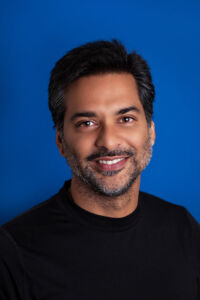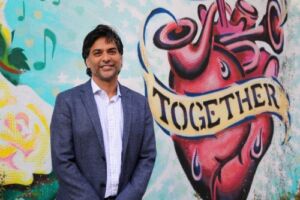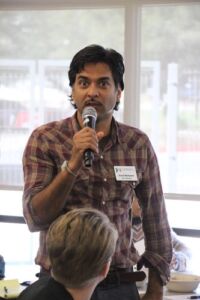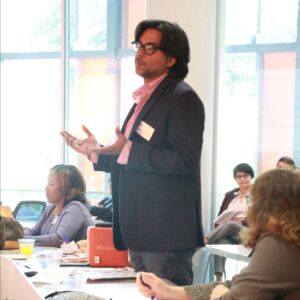May 3, 2022

“I feel like I’m a better human for having participated.”
Amit Motwani was appointed to the Central Health Board of Managers by Travis County and the City of Austin in November of 2020. His participation in Central Health’s Community Health Champions program in 2017 provided him with a thorough understanding of the complexities around providing healthcare for Travis County residents with low income.
Motwani’s executive leadership spans the arenas of strategy, operations, technology, and analytics. He came to Austin 25 years ago to attend The University of Texas at Austin, and later joined the software startup team of CTK (now Social Solutions Global), where he served as chief technology officer. Motwani led the launch of CTK’s United Kingdom branch in London and later returned to Austin, where he began his journey in nonprofit direct services with an early focus on adult literacy. In Austin he launched a 15-year professional trajectory bridging hands-on understanding of human service programming with a commercially, data-driven executive mindset.
Motwani currently serves as chief executive officer for the Rupani Foundation, an organization improving children’s school readiness and empowering marginalized communities in South Asia, Central Asia and the United States. Prior to this role, Amit was the chief operating officer at El Buen Samaritano, an outreach ministry of the Episcopal Diocese of Texas. Earlier in his career he was the chief information officer at United Way for Greater Austin where he helped transform the organization’s approach to data and analytics. Motwani served as lead adviser to the United Way and Dr. Chris King’s Policy Research Project cohort on related anti-poverty strategies at the Lyndon B. Johnson School of Public Affairs.
Q: What made you want to become a Community Health Champion?
A: As somebody who has been in health and nonprofit human services professionally for the last couple of decades, and as somebody who was previously a Medical Access Program (MAP) participant and who understood the unique pain points and challenges of not only being uninsured, but also the stressors of experiencing health challenges and finally the bureaucratic challenges and some of the dehumanizing processes of being approved for services, I just felt it would be a great opportunity to understand the inner workings of this entity that provides care and helped provide care for me as an underinsured person.
At the time when I joined the Community Health Champions, one of the things that really made me interested in it was that I was working for United Way of Greater Austin and it had been 15 years since I was a MAP recipient, and the United Way call center was helping to approve folks for the MAP program, among other services. I learned the process could happen in a couple of hours, and when I learned that, it blew me away. When I was a MAP member, I had the compounded stress of a health problem and not knowing what was going on, plus waiting a long time to be approved for MAP – the feeling of being dehumanized by being poor and waiting for approval and not being able to get care. All those things were incredibly stressful for me despite my appreciation for the program. When I saw that had changed so much, I was just blown away and I looked into it more.
The other reason is that I wanted to learn how they got from there to where they are now. (Compared to other programs) there was the ability to build out programs like this, to share their inner workings, to be transparent.
 Q: How was the experience of being a Community Health Champion compared to your expectations?
Q: How was the experience of being a Community Health Champion compared to your expectations?
A: I had high expectations, and the experience beat those expectations pretty dramatically. I was surprised at how open and transparent the organization was about its mission, its challenges in achieving its mission and how humble the organization was in addressing the challenges as well as sharing what that road map would be. I was also blown away by how receptive the organization was in taking feedback. A lot of these things were borne of the Community Health Champions program to be focused on continuous improvement, the same way the organization was. For example, we got to speak with experts on how they were going to improve specialty care and what they hoped the goals to be. These things are fascinating. It’s very fascinating to see the organization that’s working to solve those problems share their strategies and be open to feedback.
Q: Was there anything interesting or surprising about your experience?
A: Two things: One was the degree of technical information and on-the-ground information transparency that we were privy to, the degree of access to high-level policy leaders – any and all levels – nobody was too good or too boots-on-the-ground to share with us.
The second one was the cohort effect and how meaningful it was to have made the connections with so many other Community Health Champions, and the relationships that spun off that.
 Q: What did you gain personally from your experience?
Q: What did you gain personally from your experience?
A: (Becoming a Central Health board member), I don’t see it as a personal gain, I see it as a privilege to be able to serve. I gained a lot of knowledge. I became a smarter person, a person who was more connected to other community stakeholders with similar priorities. I became a more empathetic stakeholder when it came to appreciating the systemic challenges in approving access to care in an environment that systemically is already working against that. It made me a more informed, better community stakeholder, just a smarter person. I feel like I’m a better human for having participated.
Q: What advice would you give to someone who is considering becoming a Community Health Champion?
A: I’d say go ahead and fill out your application and get started in the process ASAP. Building a network that shares the same priority of providing healthcare to people with low income is an indelibly important benefit. For anyone even considering the program, there’s a high probability that you’re very interested in the well-being of the families of the community in which we live, which we’re a part of, and the greater good. Those are the people you’re going to meet, but from so many different angles. Just the benefit of the kind of information we learn, it’s akin to a university course and there’s a value to becoming a smarter, better-informed, kinder human being.
 Q: How did being a Community Health Champion influence your work for healthcare equity?
Q: How did being a Community Health Champion influence your work for healthcare equity?
A: By being able to share feedback directly with experts, not only by the team that runs the program but also by the virtue of committees that are closely involved with the Community Health Champions program. It’s influenced my work in that arena by enabling me to serve on the Central Health Board as an agent of the type of change toward health equity.
I think the program is a shining star in a world where it’s quite easy to take the convenient angle of criticizing governmental entities that are working to be part of the solution. This offers the opportunity to be a constructive part of a process that includes criticism and support, and advocacy and stakeholdership. I think the transparency that the program brings is emblematic of the organization as a whole. That was demonstrated by the Healthcare Equity Plan that Central Health just released. I’m proud that our healthcare district has this program as a component of its community outreach.
Community Health Champions is an annual Central Health program that brings together diverse community members from across Travis County to learn about, discuss, and collaborate on our work to improve the health of Central Texas.
Through a five-month workshop series, participants learn about the healthcare system for Travis County residents with low income and how Central Health and its partners come together to address health disparities.
Health Champions are challenged to think outside of their individual realities to become advocates for healthcare access and equity in their own communities.